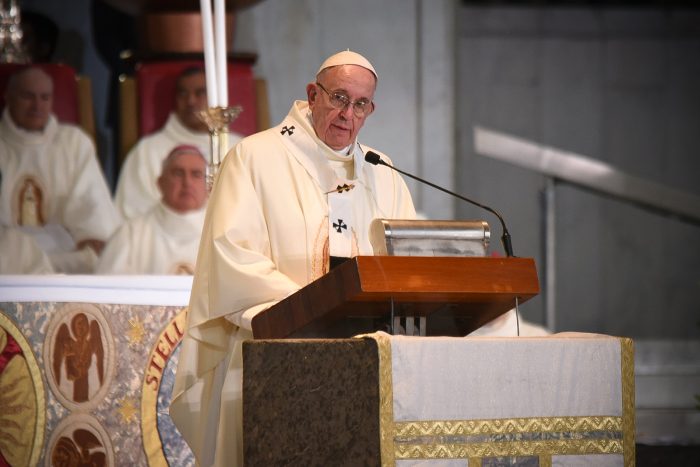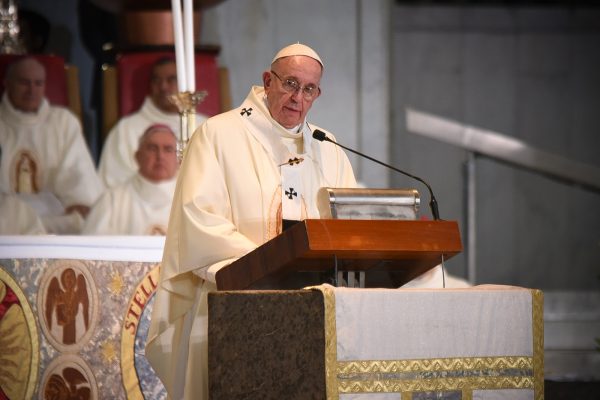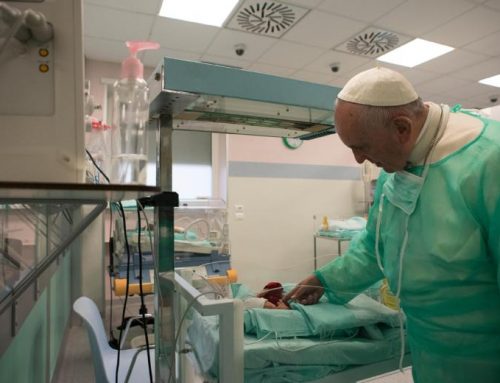In Gratitude to Pope Francis for Expressing the Church’s Strong Opposition to Reproductive Surrogacy
February 15, 2024
By Nadia Smith

Courtesy of Aleteia Image Department.
The Catholic Medical Association is grateful to Pope Francis for shedding light on the concerning trend of surrogacy, the practice by which a couple, or even a single person, enters into an agreement with a woman who is to carry and give birth to the child through in vitro fertilization. This could even involve the donation of sperm or egg, or both, further violating the human dignity of procreation. The Pope has called for a universal ban on the practice.
“The path to peace calls for respect for life, for every human life, starting with the life of the unborn child in the mother’s womb, which cannot be suppressed or turned into an object of trafficking,” he told the Diplomatic Corps at the Holy See in an address earlier this month. “In this regard, I deem deplorable the practice of so-called surrogate motherhood, which represents a grave violation of the dignity of the woman and the child, based on the exploitation of situations of the mother’s material needs. A child is always a gift and never the basis of a commercial contract. Consequently, I express my hope for an effort by the international community to prohibit this practice universally.”
In the United States, surrogacy is not federally regulated, and policies vary state by state. Some states have limited protection for surrogacy, with 10 states making commercial surrogacy explicitly legal and courts enforce both paid and unpaid surrogacy agreements. There are few restrictions on who can become intended parents in these states. Other states have no laws at all. However, commercial surrogacy is illegal in many countries in Europe and Asia. Countries such as Spain, Portugal, Italy, Germany and France have an outright ban regardless of whether it is paid or unpaid. Currently, surrogacy is a $14 billion global industry that is expected to grow to nine times that amount over the next decade.
“A mother’s womb is never meant for sale or rent,” said Dr. Greg F. Burke, the co-chair of the CMA Ethics Committee. “Surrogacy, at its core, turns human reproduction into a transactional process, devoid of the beauty of genetic relation, true marital union, and a loving communion of persons.”
The Church maintains that children should arise from an act of love between a husband and wife, in cooperation with God. The Church teaches that the use of technology to overcome infertility is good as long as it is done in a way that strengthens the marriage, respects the dignity of the spouses and of the new human life, and respects the sacred procreative act. It is morally wrong when it does the opposite as is the case with today’s artificial reproductive technologies.

As John M. Haas, Ph.D., S.T.L, the president emeritus of the National Catholic Bioethics Center, explains in Begotten Not Made: A Catholic View of Reproductive Technology, within the United States “an entire ‘industry’ has emerged with little or no governmental or professional regulations to protect the interests of the men, women or children who become involved. Women receive fertility drugs which can result in their conceiving four, five or six children at once, risking their own health and the health of their children. Some have several eggs fertilized in vitro (in a glass dish) without realizing that this may lead to the destruction of these embryos or their being frozen for later experimental use.”

Courtesy of Felipe Fernandes
That is why, even though the Catholic Medical Association, along with the National Catholic Bioethics Center and the National Association of Catholic Nurses, USA are opposed to these reproductive procedures, they recently made a public comment regarding the Centers for Disease Control and Prevention’s (CDC) move to change the reporting of pregnancy success rates from assisted reproductive technology (ART) programs and to data validation procedures from fertility clinics around the nation. CMA, with these allied associations, noted that these changes would endanger the safety of women who use assisted reproductive technology, especially women who are egg donors and surrogates, because there is already a lack of substantial research, data, and information on risks and harms to their health, which would only be compounded by this move.
Further, new manipulations of embryos are occurring, such as the engendering of a three-parent embryo. The United States does not allow the implantation of such embryos, but research is being done in the United States with embryo implantation into a woman taking place in another country. There is also other immoral research taking place like cloning. These allied associations, while expressing their opposition to these and other such technologies, believe the CDC needs to enhance regulation of ART to prevent unethical practices and research, and protect women and the children from the moment of conception from such technologies.
“Rigorous reporting of the nature of all reproductive research should be required for the protection of all parties, especially the most vulnerable, the baby who is being treated as a commodity to be purchased,” said Marie Hilliard, Ph.D., RN, co-chair of the CMA Ethics Committee. Ultimately, the issue with in vitro fertilization, especially surrogacy, and other such technologies is that they “violate the human dignity of procreation, by which the parents, through the mutual giving of themselves to each other, and in union with the Author of all life, engender a new human being,” she said.
Instead, CMA and its allied associations point to an ethical and proven way to use reproductive technology which honors and respects the fertility and dignity of each person involved, and that is Natural Procreative Technology (NaProTECHNOLOGY) along with Fertility Awareness Based Methods (FABMs).
The Pope congratulated and encouraged all those working in this field during his address last year to the WOOMB International Congress, noting the importance of “personalized medicine,” that keeps a person’s unique and unrepeatable nature at the forefront and finds ways to respect the sacred act of procreation.
“In this field, a greater understanding of the processes of procreation, using modern scientific findings,” he said is helping “many couples make informed and ethically sound decisions that are more respectful of the person and his or her dignity.”










